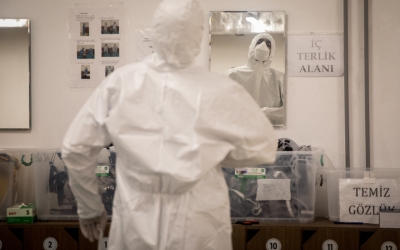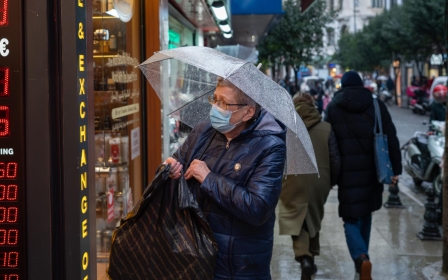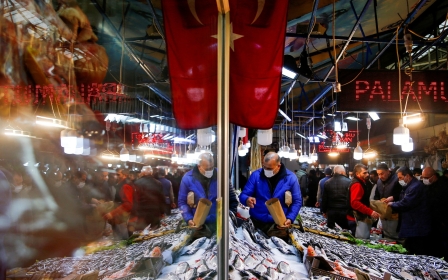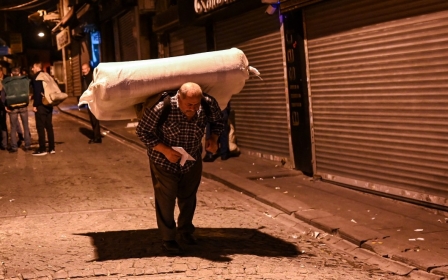Turkey: Health workers go on strike as doctor’s murder opens old wounds
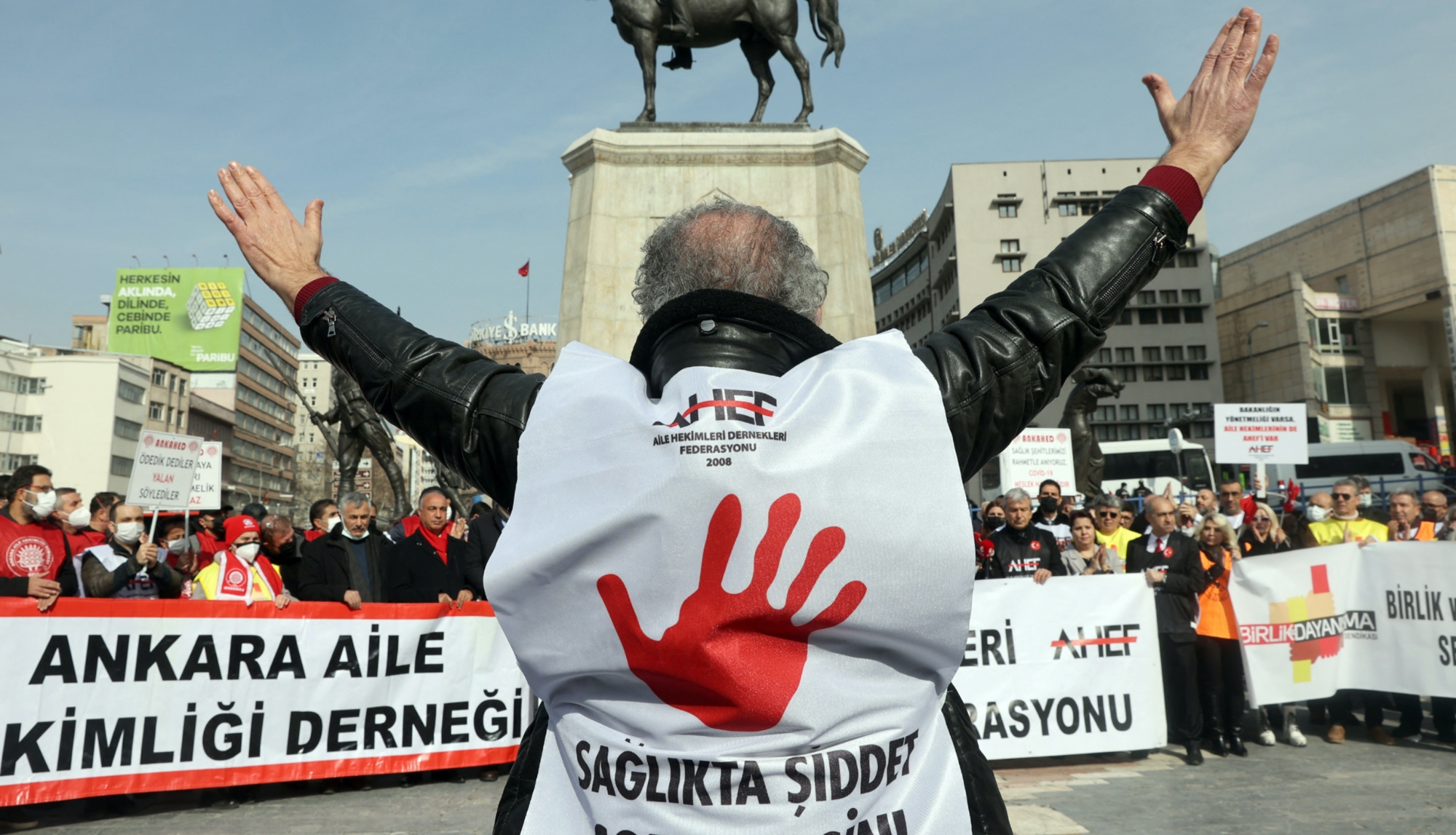
The murder on Wednesday of a doctor in Konya, a city in central Anatolia, has left Turkey shaken.
Recent years have seen a rise in violence against health workers in the country and this latest murder is another reminder of that.
The assailant, who later killed himself, was allegedly holding Ekrem Karakaya responsible for his mother’s death. She died a month after having an angiography.
According to the Turkish Medical Association (TMA), 12 doctors have been murdered in the last 17 years, while 41,768 health workers were subjected to violence in the past two years.
Karakaya's murder appeared to be the last straw, as thousands of health workers staged protests and a nationwide strike on Thursday and Friday in protest at what has become a chronic problem in Turkey.
New MEE newsletter: Jerusalem Dispatch
Sign up to get the latest insights and analysis on Israel-Palestine, alongside Turkey Unpacked and other MEE newsletters
'Violence in health'
The Union of Health Care and Social Service Workers (Saglik-Sen) has been issuing monthly reports entitled "Violence in Health". These reports show that while violence against health workers increased by 62 percent in 2021, only 11 percent of assailants were arrested, while 71 percent of them faced no charges.
The TMA and a number of health syndicates have repeatedly called on the government to pass a bill that would prevent attacks on health workers by introducing additional precautions and stricter punishments. But while the government amended the punishment law in May, its critics believe current laws are still insufficient.
“Violence is a predictable and preventable social problem, and this problem can be overcome with overarching policies aimed at solving it,” the TMA said in a statement.
Meanwhile, Turkish Health Minister Fahrettin Koca said in a tweet that the government would keep “working decisively to protect doctors' coats from blood stains.”
“I expect greater respect and a more attentive attitude from our people towards doctors,” he wrote.
But his statements have not stopped him being a target at the protest held during Karakaya's funeral.
As he arrived in the town of Develi, in Kayseri province, where the murdered doctor was buried, Koca, once seen as a hero for appearing every evening on TV channels to inform people about the Covid-19 pandemic, faced protests, and calls for his resignation.
During the demonstration, health workers and other citizens also protested against the government, while police intervention caused further uproar.
Low salaries, endless shifts
The murder and the protests have brought to the fore the problems that Turkey’s health system is facing in the post-pandemic era.
In addition to violence, Turkey’s health workers complain about low salaries, overloaded working hours and continuous shifts. Many have left the country for Europe.
'I have on average five minutes for each patient. Sometimes, I can’t even go out for lunch, instead I eat at my desk while listening to a patient'
- Sena Kerimoglu, doctor
Physicians now earn 15,000 Turkish liras ($870) per month on average, following a government decision to increase the salaries of government employees as of July amid soaring inflation. Yet, the biggest problem seems to be the working conditions.
“The salaries are low, indeed. But first of all, we want to work under proper conditions. I have on average five minutes for each patient,” Sena Kerimoglu, a public health specialist in one of Istanbul's biggest hospitals, told Middle East Eye.
“Sometimes, I can’t even go out for lunch, instead I eat at my desk while listening to a patient.”
According to TMA, the number of patients per doctor is 498 in Turkey, while this number is 341 in other Organisation for Economic Co-operation and Development (OECD) countries.
“After studying for years and years, this must not be the outcome,” Kerimoglu said.
A medical student completes six years at a university and is subsequently assigned to mandatory service, which takes place mostly in remote areas, and then sits for the medical expertise exam (TUS) to specialise in a particular field.
After the specialisation studies, they are assigned to another mandatory service. The whole process adds up to around 12 years.
Disheartened doctors
Doctors are also unhappy with night shifts, which require them to work for 36 continuous hours at least eight times a month.
Kemal, a doctor in Konya where the murder took place, said that an overhaul of the health system is needed since most of the work overload is caused by patients directly coming to hospitals without having undergone any first or second stage treatments.
“The punishments against assailants must also be increased because any attack is delaying the health services and may cause loss of life in the same hospital because another patient wouldn’t get seen,” Kemal, who did not want to give his surname, told MEE.
“But the root problem is the work overload. That makes everyone more jittery. The solution is strengthening the family physician system by mandating every patient to see a first stage care before going to an actual hospital, except in cases of emergency.”
These conditions, along with the violence issue, dishearten most young doctors and push them to leave for European countries, such as Germany or Switzerland.
'But the root problem is the work overload. That makes everyone more jittery'
- Kemal, doctor
In 2021, 1,405 doctors obtained necessary documents from the TMA to emigrate abroad, a sharp increase from before 2015, when fewer than 200 did the same. Moreover, in the first five months of 2022, 945 doctors left the country.
In March, Turkish President Recep Tayyip Erdogan hit out at doctors, saying that those who want to go abroad can “go ahead and leave.”
Erdogan has been proudly declaring that his government fundamentally changed Turkey’s health system through increasing doctors’ salaries, building new hospitals, employing more doctors, and creating an online appointment system.
Yet patients complain about the lack of doctors, the inefficiency of the online appointment system, and the insufficiency of treatments.
Middle East Eye delivers independent and unrivalled coverage and analysis of the Middle East, North Africa and beyond. To learn more about republishing this content and the associated fees, please fill out this form. More about MEE can be found here.


